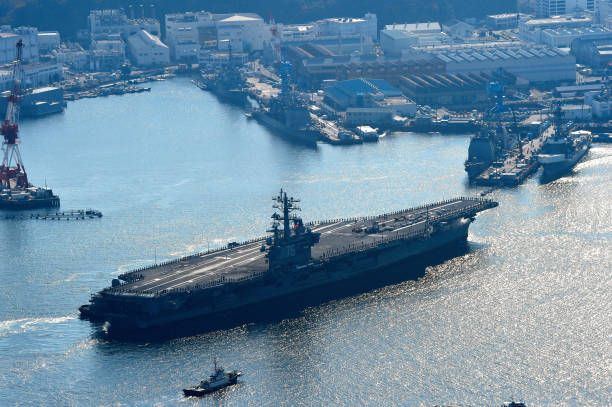US Navy Sailor In Japan Accused Of Smuggling Drugs, Under Investigation

Kanagawa Prefectural Police have sent a U.S. sailor to prosecutors Sunday over alleged smuggling of narcotic drugs into Japan from Canada.
According to the investigation officials, a 24-year-old sailor stationed at Yokosuka in Japan, who was assigned to Ronald Reagan — a nuclear-powered aircraft carrier, is suspected of importing approximately 18 grams of drugs from Canada, reported asahi.com. The two types drugs including MDMA, or Ecstasy arrived at the Narita airport from Canada twice — in December last year and January this year by international mail, reported asahi.com.
The prefectural police believe the soldier was a procurement official who deals with negotiating and awarding of supply contracts. The U.S. Navy has also reportedly searched for drug spreading in the base.
Police said the parcels were addressed to the sailor’s residence outside Yokosuka base. The illegally imported drugs were seized upon discovery by the Japan Customs. During a search of the suspect’s residence, the officials reportedly found narcotics and other banned substances, reported Tokyo Reporter. The prefectural police will conduct a follow-up inspection.
The sailor, who was assigned to USS Ronald Reagan, has reportedly declined to comment on the allegations, according to the police.
A similar incident was reported in February this year when at least a dozen sailors deployed to USS Ronald Reagan were suspected of buying, selling and using illegal drugs, including LSD and ecstasy. The allegations came into forefront when the Navy received a tip that a sailor had been using drugs. The sailor was detained and the Navy imposed a complete ban on alcohol the following day.
The Japanese authorities were also brought into the investigation amid suspicions that the illegal drugs were sold to the locals. A suspicious package that belonged to one of the sailors was stopped by local police services. The Japan Times reported that the Navy probed all the ties between the sailors and the locals to check whether the sailors were using internet for buying or selling the illegal drugs to the locals.
“The U.S. Navy has zero tolerance for drug abuse and takes all allegations involving misconduct of our Sailors, Navy civilians, and family members very seriously,” the navy had said in a statement, according to Kyodo.
Homeported at Yokosuka in Japan, the 7th fleet is U.S. Navy’s largest fleet with almost 60 to 70 vessels, 5,070 ships and submarines, 140 aircraft, and 20,000 sailors. In December last year, the USS Ronald Reagan completed a three–month voyage that included joint exercise with the Japan Maritime Self-Defense Force in the Sea of Japan and the South Korean military amid North Korea’s growing missile and nuclear provocations.
The 7th fleet has also been struck with several tragedies in the past. In June 2017, seven sailors were killed when USS Fitzgerald struck a commercial ship off Yokosuka and in August 2016, 10 American servicemen were killed when USS John S. McCain collided with an oil tanker.
© Copyright IBTimes 2025. All rights reserved.





















